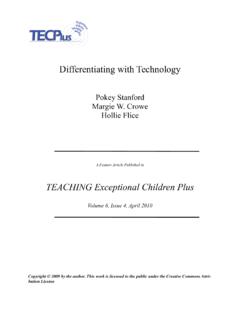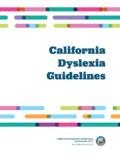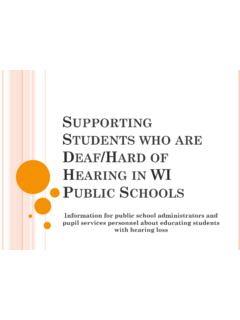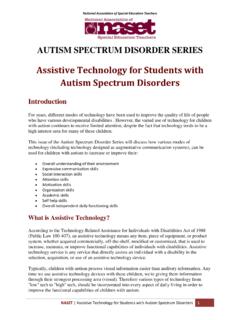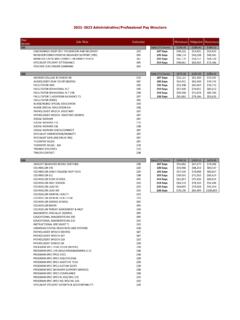Transcription of How to Write IEPs - dsawm.org
1 How to Write IEPsBy Michael L. Remus 2010 Possibilities, Inc. 2010 Possibilities, 2 Another successful IEP meeting 2010 Possibilities, 3 What do you mean 1 of my 25 students needs 1 on 1 help with 16 goals? 2010 Possibilities, 410 days notice of IEP meeting Parents must be told at least 10 days before an IEP meeting is held. If parents agree, the meeting can be held sooner. The parents are the onlyones who can do this. The school and parents must agree on the time and place of the meeting. Any member of the IEP Team can call an IEP meeting any time during the year. 2010 Possibilities, 5 What if parents don t answer? The school has to tell parents about meetings. If they don t answer, the school can meet without them. The school writes the IEP. They have to send parents a letter saying what was decided at the meeting. The school must wait 10 days if parents didn t attend the IEP.
2 This gives parents a chance to tell us what they want. Then the school can use the IEP. Parents can stop them by asking for a due process hearing. This means someone who doesn t work for the school will decide. 2010 Possibilities, 6 Language Differences What if parents speak another language or use sign language? Schools must provide an interpreter for parents if they ask. The school pays for the interpreter. The interpreter should be used for IEP meetings and any other communication with the school. If a child comes from a family whose native language is not English, the child should be tested for disability in the native language. Children cannot be put in special education because they do not speak English well. 2010 Possibilities, 7 Who Attends the IEP Meeting? Parents Student (especially after age 16) General education teacher Special education teacher Member of evaluation team who can explain evaluations School representative who knows about general curriculum, knows about the school s resources, and knows how to adapt curriculum Student and person from an agency that pays for transition services (if transition will be discussed) Anyone parents, student or school wishes to invite 2010 Possibilities, 8 What if someone isn t there?
3 The notice telling parents about the IEP meeting says who will be there. What if someone on the list doesn t come? Parents have the right to end the meeting and meet again when everyone can come. 2010 Possibilities, 9 The Individual Education Planis a legally binding document that schools mustfollow. 2010 Possibilities, 106 principles for IEP Team works together to develop the IEP shows that the student is receiving a free, appropriate public education (FAPE) and following all federal and state IEP shows the student s and family s vision for the IEP has student in special education learn with peers without disabilities as much as IEP Team makes sure IEP goals are tied to the general curriculum for a student of the same age and IEP is checked regularly during the year and needed changes are made to improve student results. 2010 Possibilities, 11 Before the IEP Meeting Ask what other members of the IEP Team will be recommending for this student so there are no surprises at the meeting.
4 Share this DRAFT IEP with the whole team before the meeting. Know the student s current strengths and needs (baseline). If there is disagreement about goals or progress, try to resolve it before the meeting. Know what is working for this student and what is not. Know what kind of accommodations or adaptations the student needs. Make a list of what you want to discuss at the meeting and share it with the rest of the IEP Team ahead of time. Send a copy of the IEP meeting agenda ahead of time. There is one in IEP Pro. Think of places where this student can be included with kids without disabilities. List places where inclusive practices has worked for this student. 2010 Possibilities, 12 During the Meeting Work to create the atmosphere of a team working together. Example: Use simple words and terms; don t make anyone feel stupid; arrange the room so everyone is comfortable; make sure everyone is introduced.
5 Review the agenda. Schedule separate meetings for hot items. Build the student s program on what s/he already know and can do. Discuss what and how other students will be told about this student s disability. Have this written in the IEP. Look for ways to make goals a natural part of the day by fitting them into the general curriculum. Look for ways to blend the goals you are recommending with the goals recommended by others. Make sure everything is clear. At the end of the meeting, decide who will do what and deadlines. Set the next meeting date and times for reporting back. 2010 Possibilities, 13 Confidentiality Under both IDEA and the Family Educational Rights Privacy Act (FERPA) all information about a student is confidential (secret). All information shared in student files or IEP meetings is confidential. If you want to share information about a student, you must have writtenpermission from the parent first.
6 2010 Possibilities, 14 Parent RightsParents have very specific rights in special education. There are 5 times when schools must give parents a copy of their first time a child is tested for parents are told about an IEP parents get written notice their child will be re-tested for due process is the school wants to change where and how the child parents don t have a copy of their rights, they should call their child s school and ask for one. 2010 Possibilities, 15 What s in the IEP How the student is doing in school now Annual goals (what s/he will learn in the next year) and how progress will be measured and reported Short-term objectives (steps to reach the annual goal) How much time, if any, student will be out of general classroom and away from students without disabilities Any changes to be made in curriculum and teaching methods assistive technology needs Behavior management or health care plan, if needed What related services s/he will need (therapy, transportation, etc.)
7 How the student will take district and state assessments Extended school year services, if any Transition services (required after a student is 16) If the student is 18, that s/he has been informed of his/her rights 2010 Possibilities, 16 Things must happen in the student is doing in school : what the student will learn next year. what related services the student will get. if the student needs help with behavior. if the student needs assistive technology . if any changes in teaching or tests are needed. what kind of report cards parents will get. if the student will take State and District tests. If the student needs services to get ready to be an adult. If the parents have other placement. 2010 Possibilities, 17 Evaluating & Planning the IEP What do you know now about this student? Testing information Progress on past IEP goals Observation data Reports from people who know this student (parent, teacher, others) What should s/he learn by year end?
8 Same as other students? Why not? What are the important issues? Behavior? Academic? Both? How is general class work evaluated? Expectations? Outcomes? What is needed for this student to access the general curriculum? Does the IEP measure up on these points? Is the focus clear? Are there high expectations? Are there new things to learn in this plan? Is the student being taught what is being evaluated? 2010 Possibilities, 18 Present levels of performance The IEP meeting must start with how the student is doing now. This includes what is going well AND what is hard. Use simple words to make sure parents understand. Don t make them ask for explanations. Some people will pretend to understand rather than admit they don t know. Parents have a right to know what is being said. 2010 Possibilities, 19 IEP Goals Need to be measurable --how will you know when s/he learns it?
9 Need to make sense Need to be a natural part of the day Must be tied to general curriculum for that age and grade of child Need to be based on the student s assessed needs Must be individualizedto the student. One size does not fit all. Need to say how goals will be worked on all during the school day (for example, speech needs to be done in class, lunch, recess, etc.) Need to blend so that a student is working on several goals at a time Need to say what teaching methods, materials or equipment are used. These must change if the student makes no progress. Need to be written to encourage interaction with students without disabilities Must be changed if the student is not goal should last forever! 2010 Possibilities, 20 What are goals and objectives? Goal what you expect the student to learn this school year Objective Short steps to get to the annual goal 2010 Possibilities, 21 Measurable Goals What is the student expected to learn (like counting to 100)?
10 When do we think s/he will learn it (by December 31st, by spring break)? How often will s/he work on the goal (daily, weekly, monthly)? How will we know when s/he has learned it (when s/he does it right 80% of the time, when s/he always does it right)? Who will teach it (teacher, speech therapist, aide)? 2010 Possibilities, 223 Basic QuestionsWhen writing IEP goals, ask:Is it meaningful to the student?Is it done as a natural part of the day?Is it tied to the general curriculum for that grade and that age of student? 2010 Possibilities, 23 Meaningful to the kid Does the student know what you are trying to teach? Is it done at a logical time (learning to do zippers when going to the bathroom)? Is it something s/he sees the other kids do? Is it something s/he canlearn? Is learning fun or a chore? Does s/he know when you are pleased with her/his efforts?
